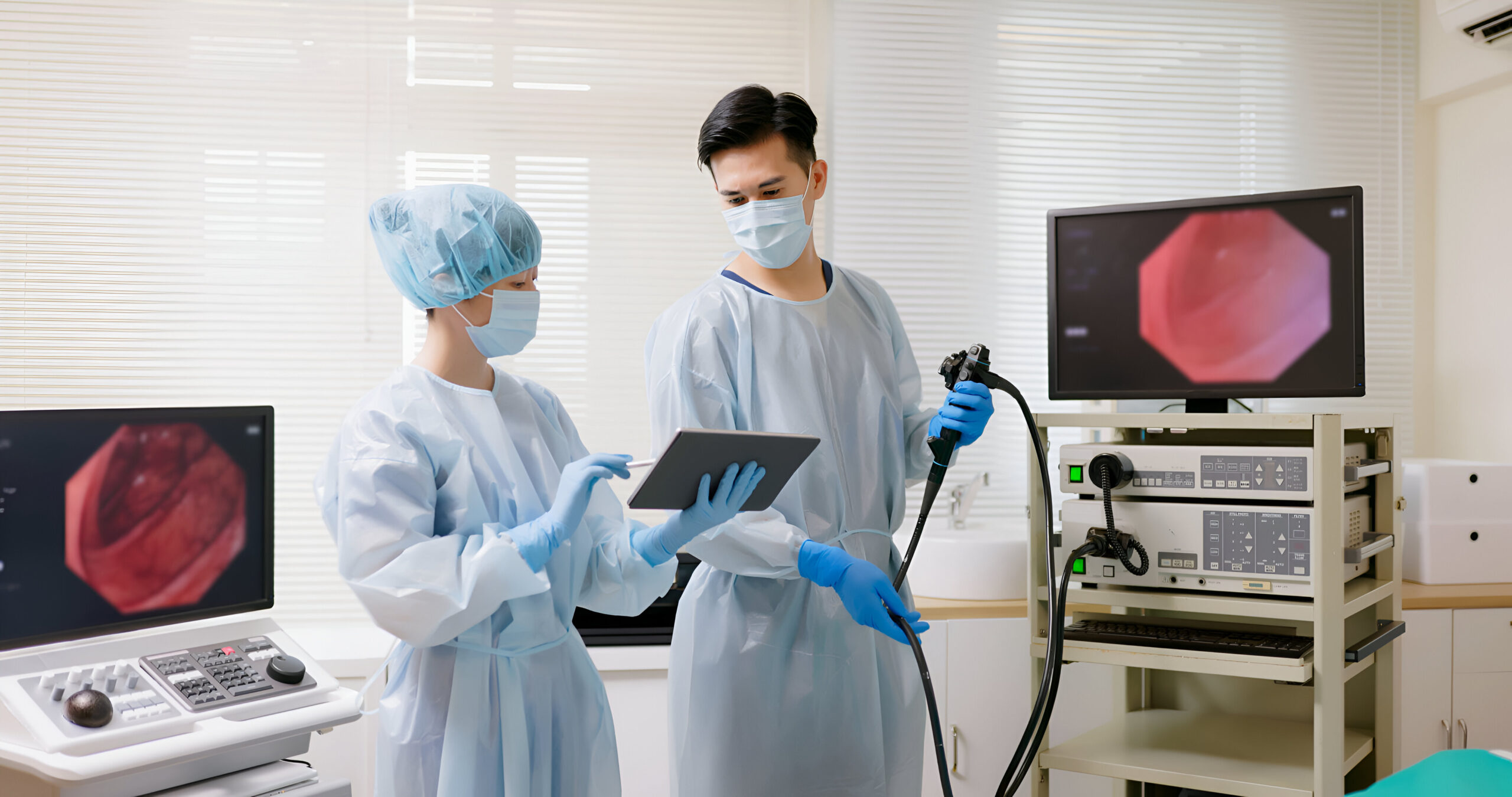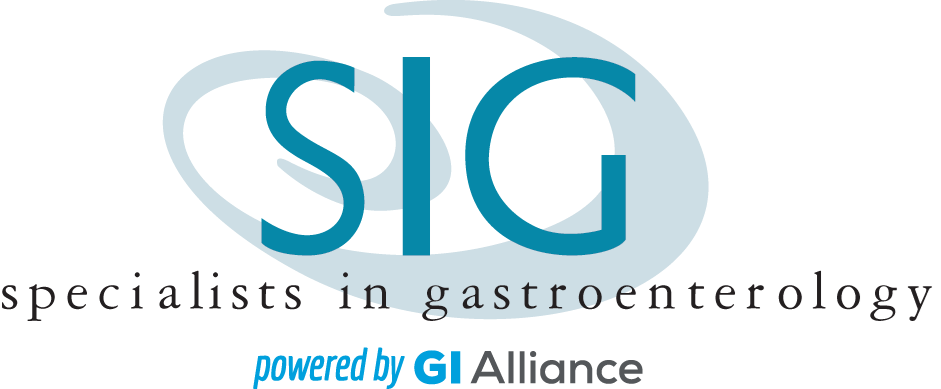Endoscopic Retrograde Cholangiopancreatography (ERCP) in St. Louis, MO
What is an ERCP?
Specialists in Gastroenterology locations in your community routinely perform endoscopic procedures to assess various types of digestive health diseases and conditions. An ERCP, or endoscopic retrograde cholangiopancreatography, is an endoscopic process where a long, slender “scope” or tube is placed into the oral cavity and gently advanced to the first section of the small intestine called the duodenum. The tube is fitted with a camera and a light on the end of it which allows the provider to assess the inner lining of the esophagus, stomach, small intestine, the opening to the bile duct, and the pancreatic duct. An endoscopic retrograde cholangiopancreatography procedure may be conducted to diagnose the reason for GI concerns, such as:
- Abnormal x-ray results
- Abnormal results from a liver test
- Pancreatitis
- Abdominal pain
Contact our St. Louis, MO facility today to request a consultation with a GI specialist to learn more about an endoscopic retrograde cholangiopancreatography.

What are the Benefits of ERCP?
An ERCP procedure may be recommended if blood tests reveal abnormal liver results, if you have pancreatic inflammation, or if you notice symptoms such as pain in the abdomen or yellowing of the eyes and skin. Some benefits of an ERCP are:
- Diagnostic and therapeutic: An ERCP serves dual purposes, helping doctors identify conditions and conduct treatment within the same process. As such, this can reduce the need to undergo multiple treatments.
- Reduced recovery periods: Individuals often have quicker recovery times with an ERCP as opposed to traditional approaches involving surgery, facilitating an expedited return to daily activities.
- Enhanced precision: An ERCP helps enable the direct treatment and visualization of the pancreatic and biliary ducts. This is crucial for correct diagnosis and treatment of a condition.
- Efficiency: The ability to identify and treat a health issue during a single procedure often reduces the overall treatment time.
What should I expect the day before my ERCP procedure?
Before your ERCP procedure, you will receive instructions from your Specialists in Gastroenterology provider about the necessary preparation. Most patients can maintain their normal diet in the days leading up to the exam. You will be advised not to ingest anything by mouth after midnight except medications. It is vital to adhere to the directions provided by your specialist. Additional instructions regarding your medications may be provided. In most instances, your medications will be followed as normal. In certain circumstances, especially in those taking blood thinners, (such as aspirin, anti-inflammatories, warfarin, Plavix®, and Coumadin®) and with diabetic patients, special instructions will be given.
What can I expect during the ERCP exam?
You will need to arrive at the endoscopy center in St. Louis, MO an hour to an hour and a half ahead of your ERCP procedure. This will give you time to complete patient forms and get ready for your ERCP. You will then need to change into a medical gown. An intravenous (IV) catheter will be started in your arm for sedation to be given. We will also connect you to equipment that will allow your specialist and our team to monitor your pulse, heart rate, blood pressure, breathing oxygen, and electrocardiogram levels during and after the procedure.
After you enter the treatment room, you will then lie on your stomach on the stretcher. Then, the IV sedation will be administered. Small amounts are administered at a time to ensure that you do not have an adverse reaction to the sedation medication and to administer only the dosage you need individually. In comparison with other endoscopic exams, it is not uncommon for general anesthesia to be utilized for an ERCP exam. Once an adequate sedation level is established, the endoscope will be gently placed into the mouth. The flexible scope will be gently advanced through the esophagus and down into the stomach, and small intestine to the area where the bile duct and pancreatic duct empty into the small bowel. A small pocket of air is administered through the scope into the GI tract to enhance visibility. In this procedure, radiographic contrast dye is introduced into the biliary and pancreatic ducts. An x-ray imaging machine is used to capture clear images of these structures to detect whether there are any concerns or abnormalities. Any fluid remaining in the upper digestive tract can be suctioned out via the endoscope. Based upon what the procedure reveals, a few treatments can be performed at the time of the ERCP, including tissue biopsies, sphincterotomy (opening the bile duct or pancreatic duct), removal of gallstones from the bile ducts or stones from the pancreatic ducts, or placement of stents (plastic/metal tubes) into the bile duct or pancreatic duct. Once the ERCP is complete, as much of the air and remaining fluid as possible will be extracted by way of the endoscope. On average, the ERCP exam takes around 30 – 90 minutes to perform based on the results.
After the exam is over, you will be moved to the recovery area to be monitored while the sedation medication begins to wear off. The extent of sedation provided during the exam and your body’s response to the medication will determine how fast you wake up; however, most people are awake enough for discharge within 45 – 60 minutes. You cannot operate any vehicles for the remainder of the day and will, therefore, need to plan to have a friend or relative take you home. You will also be advised not to work, sign important papers, or perform strenuous activities for the rest of the day. The majority of individuals can eat and drink normally after being dismissed from the endoscopy unit, however, pertinent instructions concerning medications, activity, and eating will be reviewed before release. There may be times when patients may be required to stay in the hospital overnight for for assessment or monitoring.
When can I expect the results of my ERCP?
When the ERCP is complete, the specialist and/or nursing team will explain the procedure’s findings to you. Generally, individuals do not recall what they are told in the wake of the evaluation due to the effects of the sedation. Our Specialists in Gastroenterology team recommends that you bring someone with you to whom the ERCP outcomes can also be explained, when possible. You will also go home with a typed report and will be notified of any test or biopsy results typically within seven days.
Are there any risks with an ERCP?
In general, ERCP is known to be a very safe test. Most complications that develop are not life-threatening but, in the event a complication occurs, it may lead to the need for surgery and hospitalization. Prior to the start of the ERCP assessment, a consent for treatment form will be explained to and reviewed with the patient by the clinical team. Treatment risks will once again be rediscussed by the provider before the procedure starts, and any concerns or questions can be addressed.
A condition referred to as acute pancreatitis, or inflammation of the pancreas, is the most prevalent complication. The condition can arise in 5 – 8% of individuals, although, depending on the individual, the risk can run as high as 20%. Symptoms of pancreatitis may include nausea, vomiting, abdominal pain, and possibly fever. Most pancreatitis cases are mild and require hospitalization for four days or less. While hospitalized, patients typically only need IV fluids along with nausea and pain control. A small percentage of the time, however, pancreatitis can be more severe and even life-threatening.
Adverse medication reactions from sedation can occur. Such reactions can include difficulty breathing, effects on blood pressure and the heart, irritation of the vessel used to administer the sedative, and allergic reactions. Bleeding may result from a sphincterotomy or biopsy procedure. Again, significant bleeding, like that which might indicate a blood transfusion or hospitalization, is very uncommon.
The piercing or perforation of the esophagus, stomach, or small intestine can happen. Such an event may not be recognized at some point during the test, or it might not be identified until later. In most instances, a perforation of this type will lead to hospitalization and surgery. It is important to note that this is still a very uncommon complication, even in the event that biopsies or a sphincterotomy are performed.
Among 5 – 10% of people, the evaluation might not be able to be carried out for a number of reasons. It is extremely important that the patient call the doctor’s office immediately if symptoms become evident after the procedure, such as bleeding, increasing abdominal pain, or fever.
The same as with any other exam, ERCP is not perfect. There is a slight, recognized risk that health problems, including cancers, go undetected during the procedure. It is critical to continually consult your doctors as instructed and make them aware of any persistent or new concerns or symptoms.
Should you find yourself needing an ERCP in St. Louis, MO, our GI providers can help you determine the optimal approach for your medical needs.
Are there any alternatives to an ERCP?
To an extent, the alternatives to the exam will depend upon the underlying reason for needing to undergo an endoscopic retrograde cholangiopancreatography in the first place. In most cases, the ERCP process is the best way to identify and treat certain issues in the pancreatic and biliary systems. However, a type of x-ray referred to as a magnetic resonance cholangiopancreatography (MRCP), percutaneous transhepatic cholangiogram (PTC), or endoscopic ultrasound (EUS) or echo-endoscopy can also assess the bile ducts and pancreatic ducts. Moreover, the MRCP is only a diagnostic tool. Treatment of abnormalities will require an ERCP or surgery. In addition, PTC or EUS do have treatment options.

Personalized care for endoscopic procedures
ERCP FAQs
What are some questions to ask my doctor about the ERCP procedure?
If you are informed that you require an ERCP procedure, you’ll likely have many questions or concerns and may not know where to start. Some common questions to ask your GI provider include:
- What might your doctor anticipate finding during this procedure?
- What is the overall success rate of an ERCP?
- If a complication should arise, are there any signs or symptoms you may notice?
What should I avoid doing after having an ERCP?
You should avoid driving for 24 hours after having an ERCP procedure since the anesthesia may still be in your system. As such, it is important to have a friend or family member take you home from your appointment. You may be instructed to avoid eating for a period of time, depending on what treatment was conducted during the ERCP. We also recommend taking the remainder of the day and potentially the following day off work to recover. Our team will help ensure you understand what to expect throughout the course of the ERCP process.
What procedures might be performed during an ERCP?
A few of the common procedures performed during an ERCP include:
- Placement of stents
- Biopsies (tissue sampling)
- Stone removal (gallstones and bile duct stones)
- Sphincterotomy (of the biliary sphincter)
How should I prepare for an ERCP procedure?
Our St. Louis, MO gastroenterology team will offer information on prepping for an ERCP procedure. However, some of the directions you might be asked to follow include:
- Do not drink or eat for eight hours before your ERCP procedure. (Water may be fine. Consult your provider for confirmation.)
- Do not smoke for eight hours before your ERCP appointment.
- Be sure to give your GI physician a list of all prescription and nonprescription medications you take and any allergies you may have.
